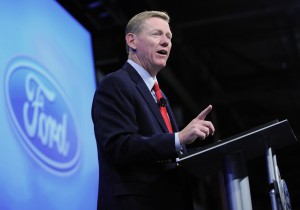
Read the fine print carefully before buying any of the newly offered Ford Motor Company shares.
Ford Motor Company (NYSE: F) announced late today a public offering of 300 million shares of its common stock at a par value of $0.01 per share. Ford said it also expects to grant to the underwriters a 30-day option to purchase up to 45 million shares of common stock. It clearly is trying to cash in on the well publicized troubles of Chrysler and GM, although its own financial health is on life support.
Ford lost $1.4 billion in the first quarter and decreased its cash from $28.7 billion in the first quarter of 2008 to $21.3 billion in cash for Q1 2009. In 2008 it lost a record $14.7 billion. The offering, depending on final price, could raise $1.8 billion in cash.
Net proceeds to Ford from the offering are expected to be used for “general corporate purposes,” including to fund with cash, instead of stock, a portion of the payments the company is required to make to the Voluntary Employee Beneficiary Association (VEBA) retiree health care trust with the United Auto Workers union, which was agreed to earlier this year. The company also has a proposal pending at the annual meeting later this week for approval to issue shares of common stock in a transaction or series of related transactions in amounts equal to or in excess of 20% of the number of shares of common stock outstanding.
In total 3,147,397,653 common shares will be outstanding, if the underwriters’ option to purchase additional shares is exercised in full. There will also be 71 million shares of Class B stock. Each outstanding share of common stock is entitled to one vote on all matters submitted to a vote of shareholders. Each holder of Class B, which is held by members of the Ford family, have 40% of the general voting power, as long as at least approximately 60.7 million shares of Class B stock remain outstanding. This means a share of B has 22 votes compared with one vote for one share of common.
This effectively guarantees that control of the company resides with the Ford family, and is one of the primary reasons the company did not seek loan guarantees from the U.S. government since family control could have been lost in a restructuring. Instead, Ford mortgaged the company before the global financial crisis hit.
 “We continue to make strong progress on our transformation plan – gaining retail market share with great new products, improving quality, reducing costs and positioning Ford for a return to profitability,” said Ford President and CEO Alan Mulally. “Today’s equity offering is another example of the fast, decisive action we are taking as we build momentum on our plan, including further progress on improving our balance sheet.”
“We continue to make strong progress on our transformation plan – gaining retail market share with great new products, improving quality, reducing costs and positioning Ford for a return to profitability,” said Ford President and CEO Alan Mulally. “Today’s equity offering is another example of the fast, decisive action we are taking as we build momentum on our plan, including further progress on improving our balance sheet.”
Ford’s actual total market share has declined in 2009.
Ford, Lincoln and Mercury sales totaled 129,898, down 31% compared with April 2008. Retail sales were down 32% compared with a year ago ,and fleet sales were down 30%. Mustang dropped 50% and F-series dropped 43%.
Year-to-dates sales plunged 40%, or 300,000 vehicles, the equivalent of the output of six final assembly plants on an annualized basis for the loss making automaker.
Ford claimed it is gaining “retail” market share, thanks in part to the success of the company’s revamped line of hybrid vehicles, which have been heavily promoted. Actual share numbers based on total market were not provided, but Ford’s overall share has been dropping for a decade or more. At the end of the first quarter, Ford’s overall share of the U.S. market, measured traditionally, was down to 13.9%, a loss of 1.1%.
Ford has not paid dividends on common stock or Class B stock since the third quarter of 2006. Furthermore, its senior secured credit facility contains a covenant restricting Ford from paying dividends (other than dividends payable solely in stock) on common stock and Class B stock.
Ford also announced on March 4, 2009, that it was deferring future interest payments on its 6.50% Junior Subordinated Convertible Debentures due January 15, 2032 beginning with the April 15, 2009 quarterly interest payment. The terms of those debentures prohibit Ford from paying dividends for common stock or Class B stock during such deferral period. As a result, it extremely unlikely that Ford will pay any dividends on in the foreseeable future.
Citi, Goldman, Sachs & Co., J.P. Morgan and Morgan Stanley are acting as joint book-running managers of the offering. Ford has filed a registration statement – including a prospectus – with the SEC.
